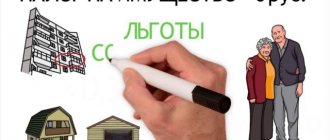The definition of the inheritance mass must be understood as the entire volume of property, rights and obligations that belonged to the deceased during his lifetime. The entire specified totality is subject to transfer to the ownership of the heirs.
Certain difficulties may arise for the descendants of the deceased in obtaining property that was not properly registered by the original owner. Problems may be associated with the re-registration of real estate for which ownership has not been fully registered, or with the return of debt accumulated during the life of a relative.
This indicates that not every item used by the deceased can be included in the totality of the inheritance mass.
What can be included in the inheritance?
The distribution between legal successors is subject to:
- the whole list of things, incl. cash;
- the existing range of property rights arising as a result of concluded agreements, legal relations of an intellectual nature, etc.;
- a fixed list of property obligations expressed in the form of debts to creditors.
The legislator limited the obligations of the recipient of the inheritance in terms of fulfilling the obligations that arose during the life of their bearer. Such a limitation is established within the price of the property that was received by the heir. This means that the performance of the duties of the testator must be performed exclusively at his expense.
Most often, citizens inherit immovable and movable things belonging to the deceased, rights and those obligations that arose during his life and were not fulfilled on the day of death.
What is hereditary mass?
The estate consists of an asset and a liability.
The assets of the estate include the property of the testator and his rights. Liabilities include exclusively obligatory obligations.
Those rights that arise from contracts concluded during the life of the testator are subject to inheritance.
The inheritance estate is compiled on the basis of the following rights of claim:
- Income due to the deceased;
- Return of funds issued as loans by the testator;
- Compensation for damage caused to both the life and health of the testator and his property.
In addition to rights and property, heirs may receive a whole set of debt obligations from a deceased relative.
The heir has the right not to enter into an inheritance that contains debt obligations that are unbearable for him.
In this case, you can simply ignore the notary's notifications about the need to enter into inheritance . When the period allotted for this by law ends, the inheritance will simply be distributed among those heirs who have expressed a desire to receive it.
However, the heir cannot receive more liabilities than assets. The law provides for the protection of heirs from excessively high debts. That is, for example, if an heir receives property worth 300 thousand rubles and debts of 500 thousand rubles, then by law he will have to pay obligations in the amount of 300 thousand rubles.
What can't be included?
The mass distributed among the relatives of the deceased can only include those items that were in the legal possession of the latter.
Based on this rule, the following are not subject to transfer to new owners:
- buildings erected without permission;
- plots of land that were seized;
- rights to receive alimony, as well as obligations to pay them;
- arising on the basis of an agreement on gratuitous use, assignment, legal relationship.
Inheritance and property considered jointly acquired by spouses cannot be recognized as a component of the total volume.
The law limits the possibility of transferring to the heirs those responsibilities and opportunities that had a direct connection with the deceased himself.
Property of the Deceased If There are No Heirs
Citizen “A” dies. He has two heirs - “B” and “C”. Three months after the death of “A”, heir “B” dies without having time to accept the inheritance from “A”. “B,” in turn, has his own heir, “G,” to whom, after the death of “B,” the right to part of the inheritance from “A” passes. This is a hereditary transmission.
Keep in mind that if the debtor dies, periodic payments due in the future will cease. At the same time, the obligation to repay existing debt does not cease. This obligation passes to the heirs of the debtor who accepted the inheritance.
The procedure for including property in inheritance
Anyone interested can declare to a notary the need to include a certain object or item in the inheritance to be distributed.
The notary himself can approve or refuse the application. If you disagree with his position, it is necessary to prepare and submit a claim to court.
A complaint sent to the Notary Chamber may not give the required result. As a result, it is impossible to do without the participation of the court.
Where should I go?
First of all, the question of including new property in the estate of inheritance must be raised before the notary. It is he who must decide whether to include the property in the list of inheritance. Only when the official refuses to satisfy the request can one proceed to filing a claim.
The claim must be transferred to the court that is located in the same territorial location as the Defendant.
Application for inclusion in the estate
The claim must comply with the standards defined in the Code of Civil Procedure. The main requirements are related to the reflection in the document:
- name of the court;
- information about the plaintiff and defendant;
- the name of the notary office, as well as information about the notary conducting the case;
- information concerning the testator, which must be indicated in the descriptive part;
- a list of those things that were not included in the inheritance;
- the grounds referred to by the notary when granting the refusal;
- indications of those documents that indicate that the listed property was the property of the deceased
The pleading part must contain the plaintiff’s reasoned request, based on the documents reflected in the application.
At the end of the document, the plaintiff puts the date of signing and his own signature.
There are no heirs who will receive the property after death
Description: A man died in a fire in a garage, the police could not find relatives to take the body and bury it. He still had a garage (registered in his name), the chairman of the GSK, taking advantage of the situation, decided to take over his garage, supposedly this garage should become the property of the GSK, so that the board, treasurer, etc. would supposedly sit there. but actually at his disposal.
This is interesting: Pension benefits for a woman with 3 children and living in the Chernobyl zone
Question: Who should get the garage if the owner has no heirs (or they have not declared their rights within 6 months)? Will the chairman be able to take possession of this garage himself, or somehow re-register it on the balance sheet of GSK? What articles, what law regulate this situation?
Sample statement of claim
Required documents
The collection of documents required for the consideration of the case by the court is the most difficult task assigned to an interested plaintiff who intends to include property in the estate. You can convince the judge of the need to make a decision to include certain objects in the estate of inheritance if you have title documentation and other papers that allow you to conclude that the deceased has property rights.
As a general rule, the following must be attached to the claim:
- additional copies, depending on the number of participants;
- initiator's passport;
- documents on the death of a relative and the existence of a relationship with him;
- will (if any);
- conclusions on the value of those items that have already been approved for distribution among the heirs.
A state fee will be required to be paid to the court hearing the case.
Estate tax
It is one thing to receive inherited property according to the law; it is quite another to properly dispose of it. The problem of taxation of such property always raises many questions among potential heirs.
All citizens, regardless of what the total inheritance consists of, the degree of relationship and other characteristics, are exempt from paying taxes. However, there are also exceptions to this rule.
In particular, income tax in the amount of 13% of the value of the property must be paid by heirs for the following objects of inheritance:
- Income as royalties from literary works received by the testator;
- Income from the sale of art and musical creations;
- Income received from the inventions of a deceased testator.
After a new heir receives property by inheritance, when the ownership of it passes from one entity to another in full, all taxes begin to be charged on a general basis.
No preferential tax systems as an heir will apply to the new owner of the property.
Property exclusion
There is a certain list of property that cannot be part of the general mass and is subject to exclusion from it at the request of interested parties.
The notary has the right to exclude. If you disagree with his actions, the interested party has the right to use judicial protection.
The exception is the property that:
- was given as a gift;
- is not owned by anyone;
- does not have an official owner or such owner is not a testator.
What happens to the property of the deceased if heirs are not declared
According to the law, property that should be inherited, but all possible heirs are either excluded from inheritance, or do not accept the inheritance or refuse it without indicating the person to whom the rights are transferred, or are absent, receives the status of escheat .
But if heirs turn up who missed the deadline for a good reason, they can restore their rights. You need to contact a notary at the place of residence of the deceased. Inheritance wills must be kept in archives for up to 70 years.
This is interesting: What payments are due at the burial of a Veteran of Labor
State duty amount
When determining the amount of state duty required for consideration of a claim, it is necessary to establish that the claim has the status of a property claim.
The basic indicator used in determining the state duty can be established from cadastral and technical documents, as well as expert findings.
If the price of the property to be added to the inheritance does not reach 10 thousand rubles, the plaintiff will need to contribute 4%, but if it exceeds 500 thousand rubles, the percentage of state duty is reduced to 0.5%.
Heirs and debts
The most common situation in practice is that the debtor died, and his spouse or close relatives (children or parents) lived with him in the apartment. The apartment belonged to the deceased. The mentioned persons continue to live in the apartment and pay bills for the maintenance of the apartment.
In this case, the claim must be brought against the estate of the deceased debtor (defendant: “the estate of the debtor, full name, place of opening of the inheritance - place of death of the deceased debtor, city of Ensk, Lenin Street, building 1). In this case, the claim must be filed in court at the place of opening of the inheritance, which is the last place of residence of the debtor (Article 1115 of the Civil Code of the Russian Federation).
01 Sep 2020 lawurist7 193
Share this post
- Related Posts
- Non-working Pensioners and Veterans of Labor will receive an Additional Supplement to their Pension in the Moscow Region
- Where to Apply for Benefits on Payment of Gas Bills Gatchina
- What benefits are the owner entitled to pay for housing and communal services if he is not registered there?
- Compensation for the Construction of a House for Large Families in the Sverdlovsk Region
Mandatory share in real estate
Minor children and disabled relatives have the right to a mandatory share in the inheritance. This also applies to real estate. Moreover, even if there is a will, such persons cannot be deprived of their entire share. Maximum – reduce by 50%. And if the will does not include a disabled or minor person who is obliged to receive his part of the inheritance, this is a reason to invalidate the document.





